How to overcome guilt and shame in addiction recovery

Understanding the Emotional Journey of Addiction Recovery
Addiction recovery is a deeply personal journey, fraught with emotional challenges that can hinder or help an individual's path to healing. Among these emotions, guilt and shame stand out as particularly potent. While similar, they affect individuals differently and navigating them is essential for successful recovery. In this narrative, we explore the nuances of guilt and shame, their impact on the recovery process, and strategies to manage these powerful emotions.
Differentiating Between Guilt and Shame
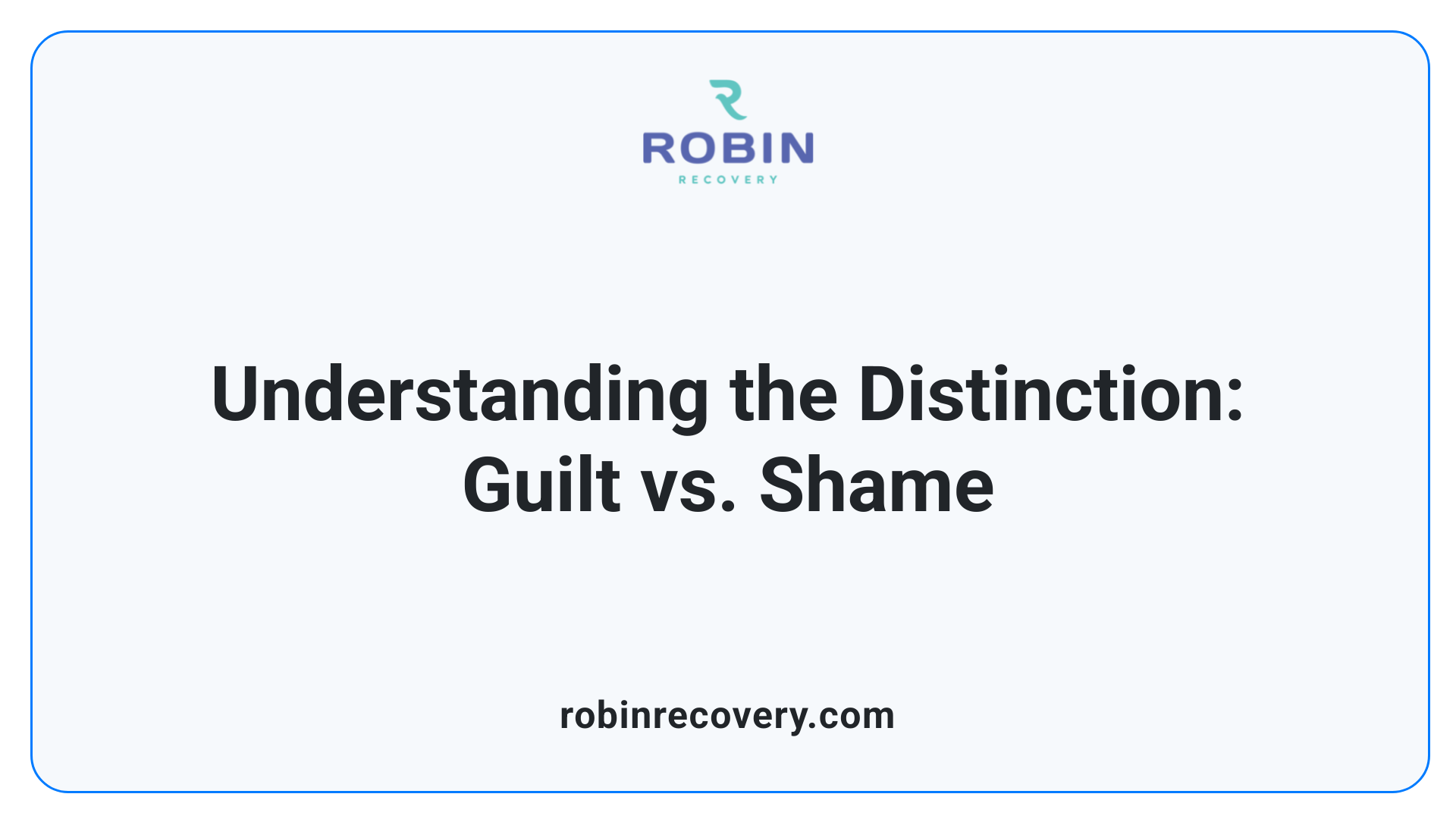
Definition and Impact of Guilt in Recovery
Guilt arises when individuals feel responsible for actions perceived as harmful to others. This emotion can be a powerful motivator in addiction recovery, prompting individuals to confront their past actions and seek to make amends. Engaging with guilt can facilitate personal growth and emotional healing, helping people to take ownership of their behaviors. It encourages responsibility and can lead to restorative actions, which are crucial for progress in recovery.
Definition and Impact of Shame in Recovery
Conversely, shame is characterized by a negative self-assessment; it causes individuals to feel fundamentally flawed or unworthy. Unlike guilt, which can lead to constructive outcomes, shame often results in avoidance and self-punishment, creating barriers to recovery. Persistent feelings of shame can fuel feelings of worthlessness, triggering relapse and hindering the recovery journey. Recognizing and addressing shame is vital for emotional health and healing.
Self-Blame Orientations Affecting Guilt and Shame
Self-blame orientations play a significant role in how individuals experience and manage these emotions. Those with a retributive self-blame orientation may feel permanently flawed, which exacerbates feelings of guilt and shame. In contrast, a scaffolding orientation allows individuals to see themselves as capable of change. This self-empathy can help them effectively manage guilt and shame, fostering a more constructive path in their recovery journey.
Emotion Definition Impact on Recovery Guilt Feeling responsible for wrongdoing Can motivate amends and change Shame Feeling intrinsically flawed Often leads to resistance and relapse
The Role of Guilt and Shame in Addiction Recovery
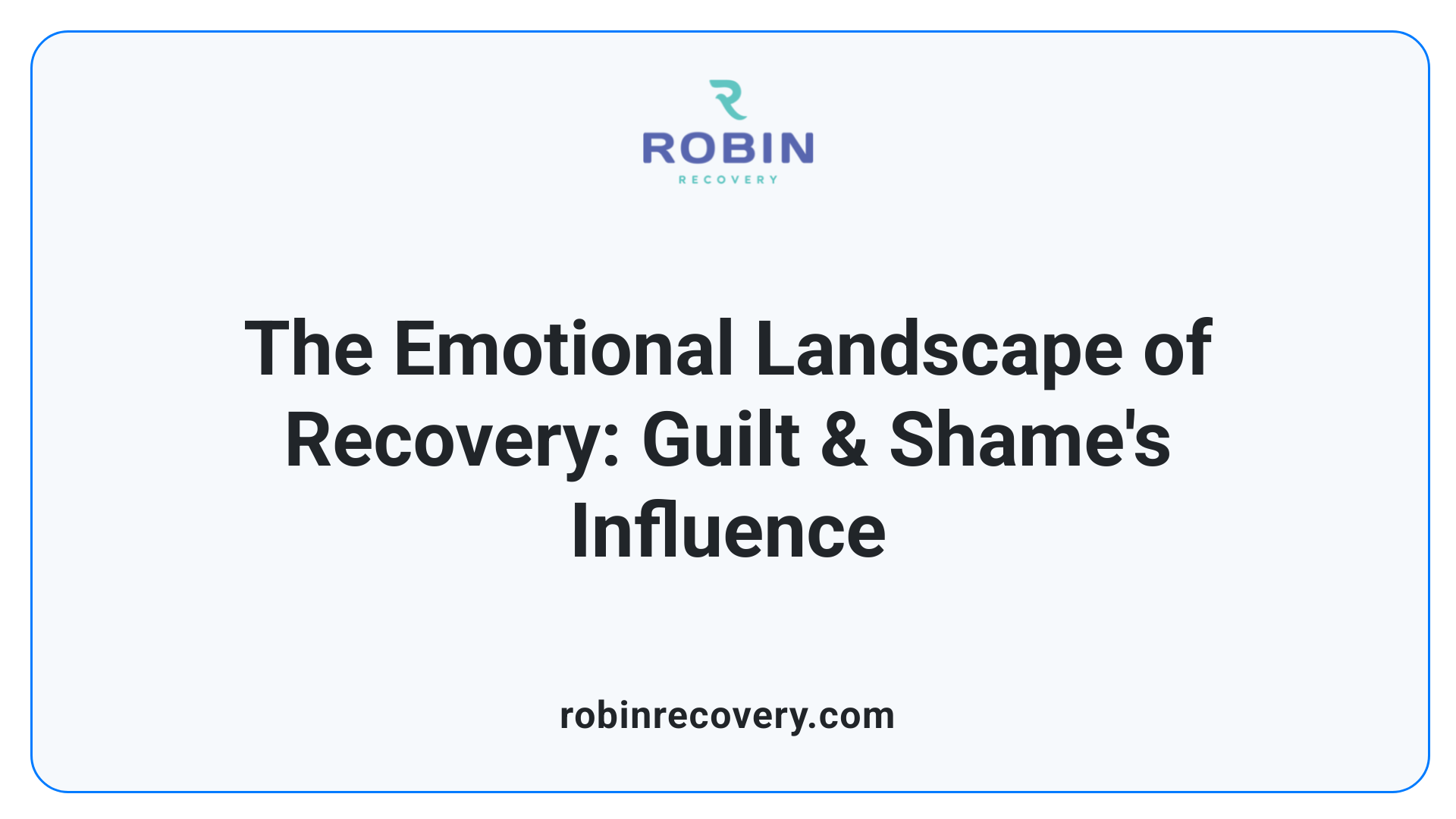
How guilt and shame affect recovery
Guilt and shame are powerful emotions that significantly impact individuals facing addiction. Guilt, associated with feelings about actions taken, can serve as a catalyst for recovery. It promotes awareness of past harmful behaviors, encouraging individuals to make amends and take responsibility. This emotion can motivate them to seek support, foster positive changes, and ultimately strengthen their recovery path.
On the other hand, shame is linked to feelings of being fundamentally flawed or unworthy. This deeper internalization can be detrimental, leading to negative self-perceptions that undermine progress. Persistent shame often results in feelings of isolation and unworthiness, which can trigger relapse and hinder the pursuit of support necessary for healing.
Guilt as a motivator vs shame's hindrance
Understanding the distinction between guilt and shame is crucial for effective recovery. Guilt can facilitate constructive behavior, prompting individuals to confront their past and initiate meaningful changes. In contrast, shame tends to create a cycle of self-punishment and avoidance, ultimately exacerbating feelings of worthlessness.
Therapeutic strategies should focus on enhancing constructive feelings of guilt while addressing and alleviating shame. This approach can help individuals navigate their emotional landscape more effectively, leading to better recovery outcomes and a renewed sense of self-worth.
Emotion Definition Impact on Recovery Guilt Related to actions and responsibility for harm caused Can motivate change and promote recovery Shame Related to perceived self-worth and identity Can hinder progress and exacerbate addictive behaviors
Strategies for Overcoming Guilt in Recovery
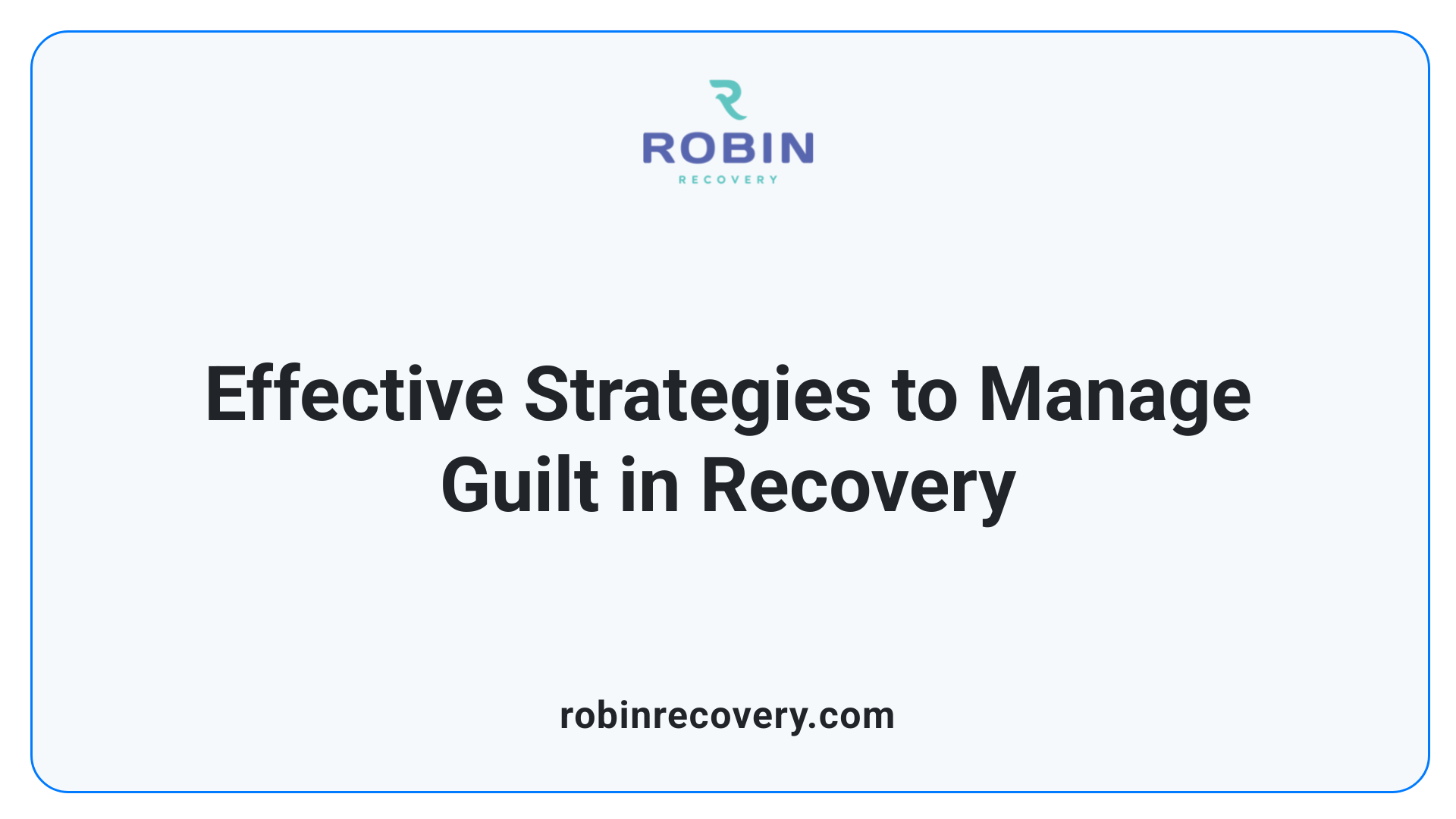
What strategies can be used to overcome guilt in addiction recovery?
Overcoming guilt during addiction recovery involves several practical strategies that can help individuals navigate these challenging emotions. A crucial first step is identifying the source of guilt, which often stems from past actions that conflict with one’s values. Engaging in open discussions with trusted family members or therapists can facilitate this process, allowing individuals to explore and articulate their feelings of guilt.
Additionally, channeling guilt into positive actions can be empowering. This might include making amends with those harmed or getting involved in community service or volunteer work, which can enhance a person’s sense of purpose and belonging. Taking responsibility for past actions by acknowledging mistakes and striving for improvement can transform guilt into a motivational force for personal growth.
Equally important is the role of self-compassion in managing guilt. Practicing self-kindness helps individuals understand that making mistakes is part of the human experience. Focusing on aspects of life that are within your control rather than dwelling on past errors fosters a more forgiving self-image. It promotes healing by encouraging individuals to view their experiences as valuable lessons rather than defining moments.
Ultimately, persistent feelings of guilt may require professional intervention. Therapy can provide essential support for addressing underlying issues, ensuring that guilt contributes positively to the recovery journey rather than hindering progress.
Managing Guilt and Shame During Recovery
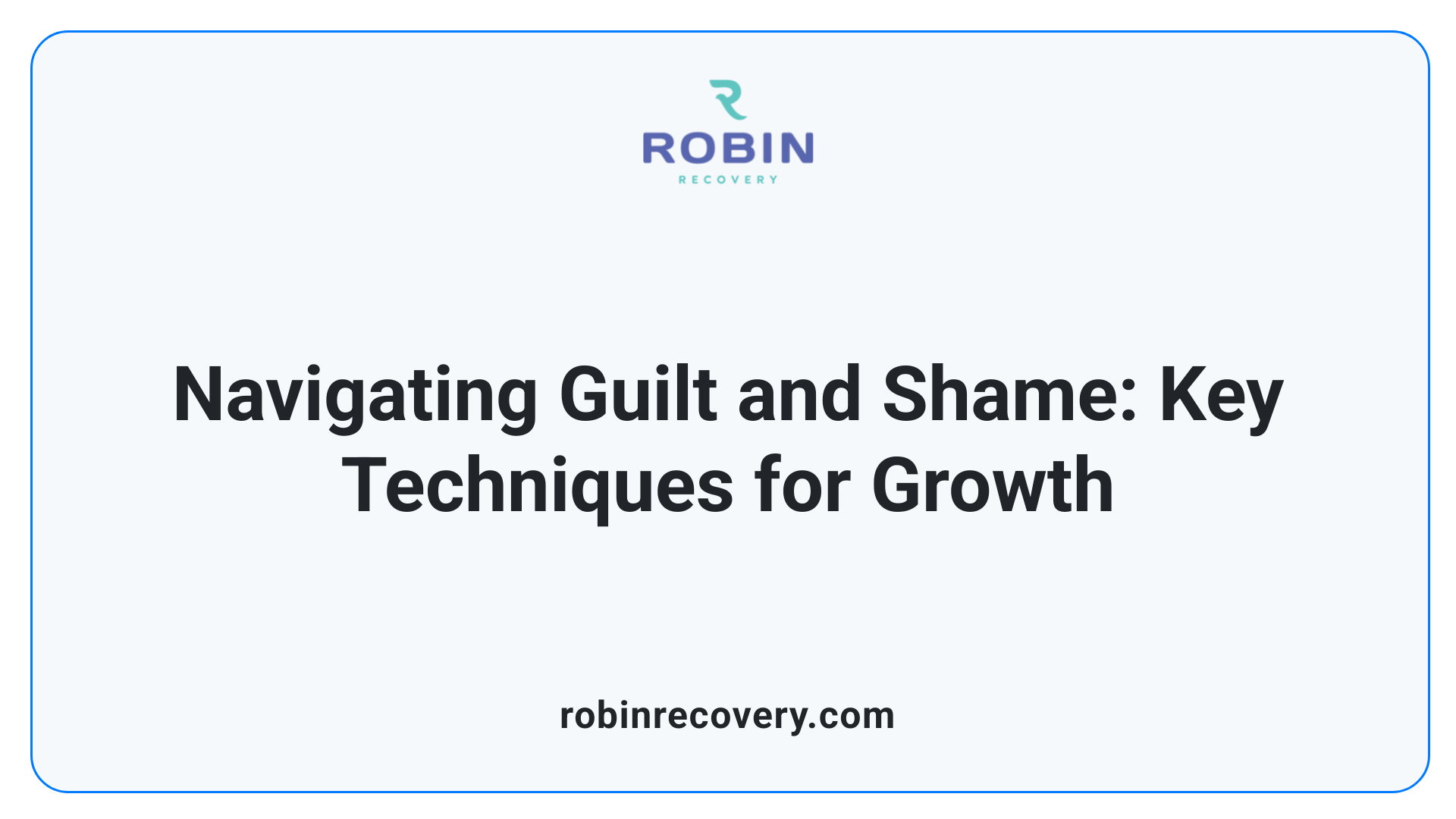
Acknowledging and Addressing Feelings
Managing guilt and shame during recovery can be challenging, but it is essential for personal growth. Acknowledging that these negative emotions are common in the recovery process is a vital first step. Recognizing feelings of guilt—that sense of remorse for past actions—and shame, which often reflects deeper self-criticism, allows individuals to confront these emotions rather than avoiding them.
Self-forgiveness plays a crucial role in healing. It’s important to forgive oneself after making amends for previous behaviors. Practicing self-compassion helps individuals to treat themselves with kindness and patience throughout their recovery journey.
Building a Supportive Network
A strong support network can significantly aid in overcoming feelings of guilt and shame. Surrounding oneself with empathetic friends and family members fosters a positive environment for sharing experiences. Engaging in support groups or counseling provides a safe space to process emotions openly. This community can offer understanding and encouragement, reducing feelings of isolation that often accompany addiction recovery.
Redefining Personal Identity
It is equally important to redefine one’s identity in recovery. Focus on strengths, accomplishments, and the person you aspire to be, rather than dwelling on past mistakes. This shift in self-perception is essential in letting go of guilt and shame. By emphasizing growth and potential, individuals can disassociate their self-worth from their past actions, paving the way for a healthier mindset moving forward.
Letting go of things outside of one’s control, particularly past actions, enables individuals to focus on their recovery journey rather than the burdens of guilt and shame.
Therapeutic Support for Guilt and Shame
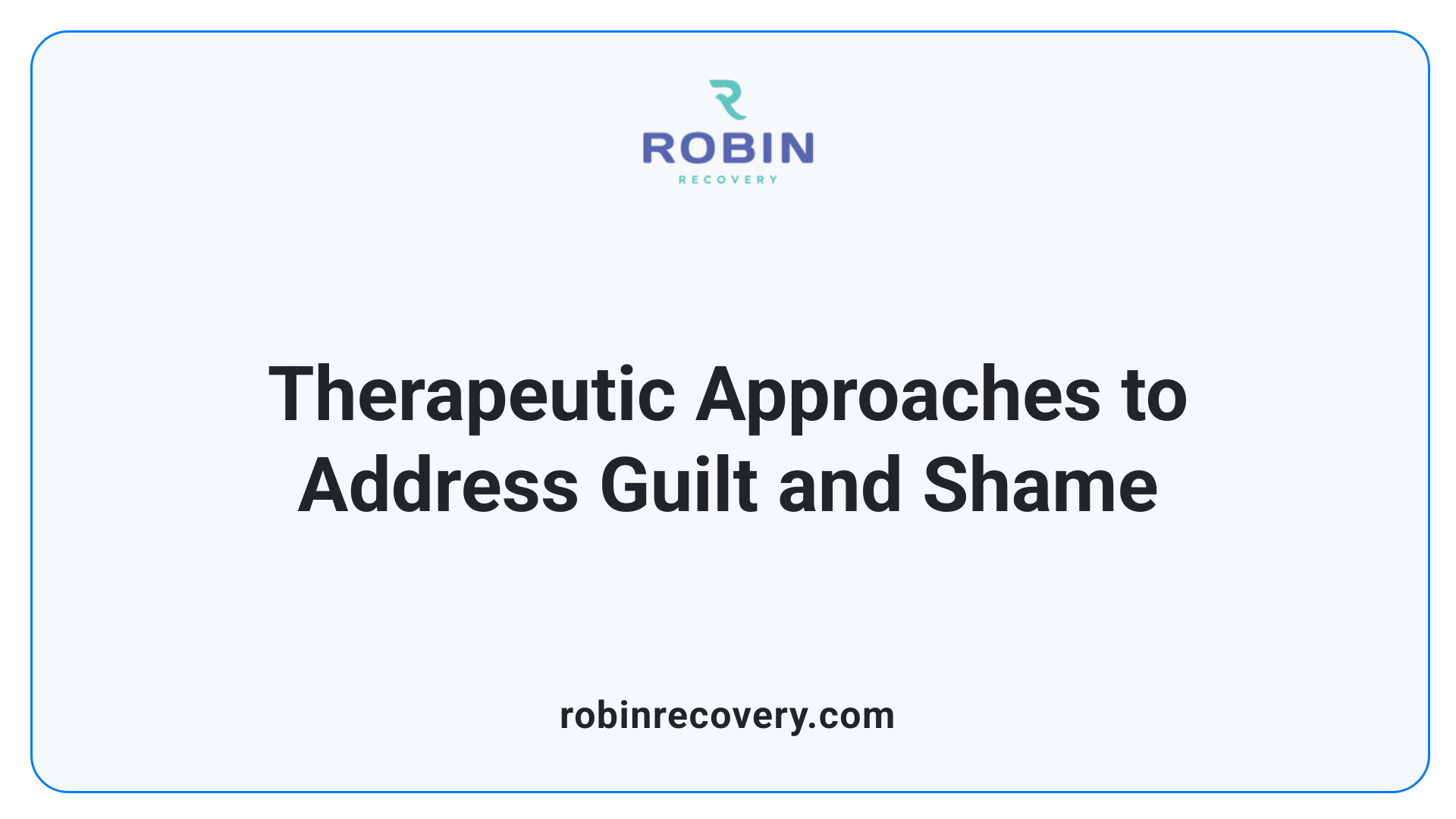
How can therapy help in dealing with guilt and shame?
Therapy can be a powerful tool in dealing with guilt and shame by helping individuals acknowledge and process these feelings in a supportive environment. It encourages self-compassion, enabling people to forgive themselves and move past feelings of worthlessness.
Moreover, therapy assists in identifying the roots of guilt, which could stem from personal beliefs, cultural norms, or past experiences, allowing for the reframing of these emotions into constructive actions.
Recognizing the difference between guilt and shame is crucial; guilt relates to actions while shame pertains to self-identity. This understanding allows for a clearer path towards healing.
Techniques for emotional resilience
Several techniques can aid in building emotional resilience against guilt and shame:
- Mindfulness practices: Help individuals stay present, observing thoughts without becoming overwhelmed.
- Self-compassion exercises: Teach individuals to treat themselves kindly, fostering acceptance of their struggles without harsh judgment.
- Engagement in healthy activities: Replace harmful behaviors with exercise, meditation, and creative pursuits, promoting emotional well-being.
Cognitive Behavioral Therapy and shame resilience theory
Cognitive Behavioral Therapy (CBT) and Brené Brown's shame resilience theory are particularly effective in this context. CBT helps individuals challenge negative thinking patterns associated with guilt and shame, empowering them to replace these with healthier thoughts.
Shame resilience theory focuses on understanding shame triggers and developing strategies to cultivate self-worth. By combining these therapeutic approaches, individuals can navigate their emotional landscapes, transforming guilt from a burdensome emotion into a catalyst for positive change.
Mindfulness and Emotional Regulation
Importance of mindfulness in recovery
Mindfulness plays a crucial role in addiction recovery by helping individuals remain aware of their thoughts and emotions without becoming overwhelmed. Being present allows individuals to navigate feelings of guilt and shame effectively, drawing attention away from destructive thinking patterns that can derail recovery efforts.
Living in the present to manage emotions
Living in the present moment enables individuals to observe their feelings rather than react impulsively. This practice aids in recognizing guilt and shame as passing emotions instead of permanent states of being. Embracing the present helps mitigate the hopelessness often associated with dwelling on past mistakes, fostering a healthier self-image.
Mindfulness practices to combat guilt and shame
A variety of mindfulness practices can support emotional regulation during recovery. Techniques such as meditation, deep breathing exercises, and journaling offer individuals tools to process emotions constructively. Regularly practicing these techniques reinforces positive self-talk, allowing individuals to confront guilt and shame with understanding and acceptance. Incorporating mindfulness into daily routines establishes a foundation for healing and personal growth as part of the recovery journey.
The Importance of Support Systems
Building Supportive Relationships
Having a strong support system is vital in the journey toward recovery from addiction. Supportive relationships provide individuals with a safe space to express their emotions and challenges without judgment. These relationships can foster a sense of belonging and reduce feelings of isolation often experienced during recovery.
Talking Openly About Recovery
Open communication about recovery and the emotions tied to guilt and shame can significantly aid healing. Sharing experiences helps individuals process their feelings and articulate their struggles. This dialogue not only normalizes the recovery process but also invites empathy and understanding from others, reinforcing self-acceptance.
Role of Family and Community in Recovery
Families and communities play an crucial role in supporting recovery. Families are encouraged to engage actively in their loved ones' recovery journey, allowing individuals to confront guilt while creating an atmosphere of accountability and encouragement. Communities can provide resources and support groups, creating networks where individuals can connect and share their stories. Together, these elements help transform guilt and shame into opportunities for growth and connection.
Support System Elements Importance in Recovery Potential Benefits Building Supportive Relationships Creates a safe emotional environment Reduces feelings of isolation Open Communication Encourages expression of feelings Promotes self-acceptance and understanding Family Involvement Helps confront guilt and creates accountability Fosters commitment towards recovery Community Resources Provides access to support networks and information Enhances connection and normalized experiences
Embracing a Healthier Emotional Future
Understanding and managing guilt and shame is crucial in addiction recovery. By differentiating between these emotions and strategically addressing them, individuals can break the cycles of negative thinking and behavior that can hinder recovery. With the support of therapy, mindfulness, and a strong network of caring individuals, it is possible to transform these emotions into catalysts for growth, healing, and a resilient future. Remember, recovery is not just about overcoming addiction; it is about redefining your identity, embracing self-compassion, and moving towards a more positive and fulfilling life.
References
- National Helpline for Mental Health, Drug, Alcohol Issues - SAMHSA
- How to Overcome Guilt and Shame in Recovery | AAC
- Overcoming Shame and Guilt in Recovery | Ashley Treatment
- 10 Tips to Overcome Shame and Guilt in Addiction Recovery
- How to Cope and Overcome Guilt and Shame During Recovery
- Navigating Guilt and Shame in the Recovery Journey
- How Do Feelings of Guilt and Shame Feed Addiction? - GoodRx
- In Addiction and Recovery, Guilt Heals While Shame Poisons
